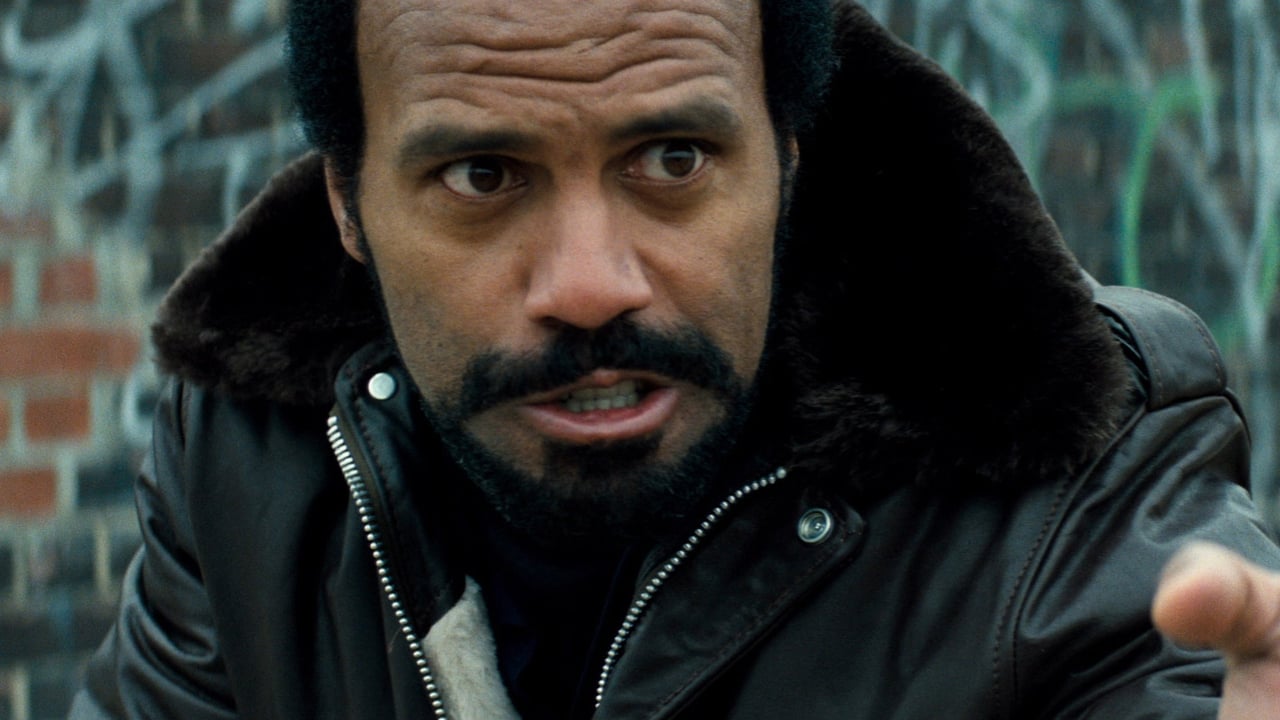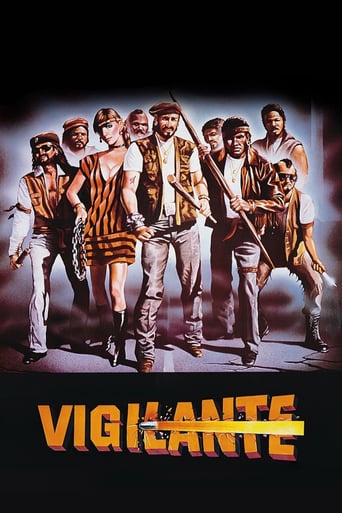

If like me you are an avid fan of sleazy and grubby looking flicks packed with sleazy and grubby looking characters, filmed in sleazy and grubby looking locations then this is the film for you. The film is essentially a revenge thriller, which tips an over sized Barbisio hat to the Italian Euro-Crime flicks of the 1970s: A bitter protagonist; middle-aged hoodlums(who should know better at their age); corrupt judges; a car chase(or three); clichéd dialogue; mindless- slaughter, and Fred "That Man Bolt" Williamson. The film stars Robert Forster playing an unremarkable factory worker whose life is suddenly beset by an inconceivable tragedy and (without giving too much of the plot away) he finds himself requiring little encouragement in joining a group of vigilantes led by his co-workers Williamson and two other colleagues. The film certainly doesn't pull any punches with the protagonists dispensing some reasonable savagery on any wrongdoers along the way. Some class acting from Forster and Williamson keeps the viewer interested throughout and the climactic fight scene at towards the end of the film, wouldn't look out of place in an Enzo Castellari or Umberto Lenzi flick. This is a well paced, well acted and thoroughly engrossing '80s exploitation film, with a compelling soundtrack and a nice little cameo from Italian director's favourite Woody Strode.Watch at (almost) all costs!
... View MoreKinda sad to see Forster's roots in a flick like this.The script is terribly heavy handed and the direction may have tried to compensate, but failed. You might demur that it is, after all, a little action flick snack, but the film won't let you get away with that: You can't have it both ways.It obviously attempts to cop some fire from the "hard" reality of urban crime. You can't make a feint toward that end, then trivialize it with lousy scenario work, acting, and direction, and then expect to hide behind a defensive claim that the viewer made the mistake of taking it too seriously.It's a fine example of a flick that fails to manage its "tone" correctly. It feels like a movie made by grown-up teenaged boys.Interesting comparison: Check out Forester in Jackie Brown. Thank the Good Load Aboff, Forster got to work out in a flick that set its sights on a story and stealthily took great strides of scenario, acting, and direction to make that story blossom like a fine and beautiful flower in our minds.Anyway... who is going to watch Vigilante now? I would highly recommend it for a film class, for subsequent group analysis to try to nail down the contours of its failure to deliver something artistically meritorious.
... View MoreEven though the original "Death Wish" dates from 1974 already, the popularity of "vigilante" movies only truly skyrocketed during the late 70's and especially during the early 1980's. This shouldn't come too much as a surprise because the early 80's were a glorious period for all kinds of cheap and gritty exploitation cinema. Vigilantes and neighborhood watches are themes that all too easily lend themselves for gratuitous violence, sleaze, controversy and provocative footage. Some movies nevertheless still attempted to narrate a more intelligent and engaging story, like for example Lewis Teague's "Fighting Back", but most contemporary vigilante flicks are simply an excuse to show as much extreme violence as humanly possible, like parts II and III of the "Death Wish" series, "Tenement: Game of Survival" and "The Exterminator". This particular vigilante movie – with the most basic yet straightforward title imaginable – situates itself somewhat between the two categories. "Vigilante" contains several sequences that depict harsh and exploitative violence, yet surprisingly enough it also attempts to bring a proper story and detailed character drawings. I deliberately use the words "surprisingly enough", because the director – William Lustig – isn't exactly known for subtlety or adequate storytelling. The man became infamous thanks to "Maniac" a few years earlier and that film is now, 30 years later, still one of the most prototypic examples of cruel and disturbing exploitation cinema. Therefore I must admit being impressed with the plot and the atmosphere of despair William Lustig tries to generate. Eddie Marino is an earnest factory worker and lives with his wife and young son in one of New York City's grittiest and gang-infested neighborhoods. His friend and co-worker Nick often insists for Eddie to join the neighborhood vigilante squad, because the Puerto Rican gang is becoming more and more powerful while the police appears less and less in the streets, but he refuses because he truly believes in the country's juridical system. Even when Eddie's wife is found stabbed and his little boy murdered, he still has faith that he US court and the honorable judge will righteously punish the culprit. But the honorable judge is corrupt and the whole system is rotten, as the guilty gang members are acquitted and Eddie himself has to go to jail for 30 days for assaulting the judge. Whilst in jail, the idea of joining Nick's vigilante squad suddenly becomes all the more appealing. This may perhaps disappoint some die-hard exploitation fanatics, but admittedly "Vigilante" is a lot less graphic or sickening than – say – the "Death Wish" sequels for example. The assault on Marino's household is rather nasty and so are a handful of other scenes, but clearly the emphasis of the film remains on Eddie's emotional and mental journey. Lustig does a terrific job in depicting New York's suburbs as menacing ghettos where danger lurks behind every corner and literally nobody can be trusted. He should know, of course, as Lustig himself grew up in The Bronx. Robert Foster is excellent is his lead role as the tormented Eddie Romero, but the most memorable roles can be found in the supportive cast. Fred Williamson, as the founder and commander of the vigilante squad, is deliciously deranged and actually a lot more dangerous and fanatic than most of the gang members. Veteran actor Woody Strode briefly appears as a fatigue but inspiring inmate, Vincent Beck is terrific as the corrupt judge and my absolute favorite supportive character is Joe "Maniac" Spinell's sleazy and loathsome attorney Eisenberg. He shamelessly defends the assailants and knows exactly how to manipulate a court and obtain minimum punishments for heavy criminals.
... View MoreWilliam Lustig's follow-up to MANIAC concerns a blue-collar worker (Robert Forster) whose wife and child are attacked by a gang of punks (right out of John Carpenter's ASSAULT ON PRECINCT 13), with a crooked judge allowing one of them (the one who knifed the wife) off without time served. Instead, Forster is sentenced to 30 days in prison (Rikers, presented as if Hell behind bars) for trying to strangle the judge (and rightfully so) while his co-workers (led by Fred "The Hammer" Williamson) have formed a vigilante trio after the head honcho behind the drugs trafficking to teenagers on his street. When Forster gets out of prison he wants revenge on those who have wronged him, joining up with Williamson and his men.This movie is essentially Lustig's DEATH WISH; Forster stepping into the Bronson Paul Kersey role. Williamson is one cool customer, though, and the New York locations offer flavor, grit, and color heightening the action scenes and adding potency to the subject matter. While not exactly a nightmarish wasteland as the city Bronson must contend with in DEATH WISH III, New York City sure seems dangerous enough through Lustig's lens. Nothing original and Forster, while getting revenge on the main culprits behind his loss (his son is shot-gun blast with the killer chased by Forster in Lustig's own French Connection street car chase, Forster's wife leaving him because of her trauma), doesn't necessarily get as even on the entire group of the Headhunters as Kersey did in DEATH WISH II. The film features plenty of use of blood squibs as one scene shows the Headhunters gang opening fire (with machine guns) on a patrol car, blowing away two policemen, with Williamson shot-gun blasting a wealthy drug supplier masquerading as an Italian businessman. Woody Strode has a cameo as a prisoner in Rikers who saves Forster from a shower room rape, certain to elicit applause—he leaves more of an impression with a few minutes than many do with two hours. Williamson's charisma alone adds value to this movie, even if it does cover familiar ground. Joe Spinell has another memorable supporting part as an oily attorney who seems to be in cahoots with the judge, both willing to use the courts to get scumbags off if they can afford them.
... View More